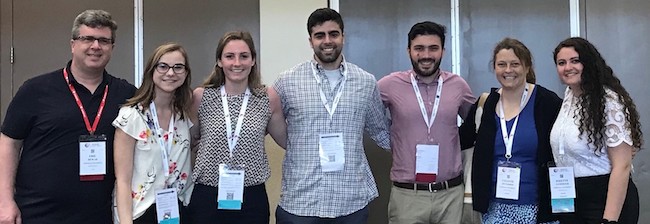Biology Students Share Research Findings at International Conference
The value of scientific research is more fully realized when discoveries are communicated to others, and Suffolk Biology students had the opportunity to present their research findings at an international conference attended by nearly 12,000 people.

The student scientists from the Class of 2019 communicated the data they had collected through poster sessions as part of the Experimental Biology conference, held last month in Orlando, Florida.
“Some people were asking me questions about things I haven’t thought about before,” said Nicole Asquino, a biology major, who walked away from her presentation more confident than ever in her scientific communication skills. “Their feedback was very helpful because it allowed me to think on my feet. This was one of the most positive experiences of my time at Suffolk.”
Skull Shape Linked to Aggression
Asquino and student Michael Smith presented their work on the shape of seal and sea lion skulls to the American Association of Anatomists and discussed how those shapes relate to feeding and aggression.
“Nicole and Michael talked about their methods, the results, and how they are interpreting those results,” said Suffolk Biology Professor Eric Dewar, who supervised the students’ project.
“One of the biggest things they found is that, as the skulls of these animals grow, each species has a different pattern of growth depending on whether it is going to be aggressive or not.”
Nervous System & Mutations
Students Shannon McLaughlin and Josette Nammour presented a research project related to the neural biology of the roundworm to the American Society for Biochemistry and Molecular Biology.
Their work, supervised by Suffolk Biology Professor Annette McGehee, illustrated how the nervous system develops and how mutations in genes can alter that growth.
Connecting Student Scientists
Student Domenic Abbondanza focused his research on the genetic regulation of a gene that protects against oxidative stress in single-celled bacterium. Suffolk Biology Professor Celeste Peterson supervised his research. In addition to competing for a poster prize, Abbondanza participated in a panel discussion on how to run a successful student chapter of the American Society for Biochemistry and Molecular Biology.
The students’ travel to the conference was sponsored by a grant from Suffolk’s Office of Student Leadership & Involvement.



